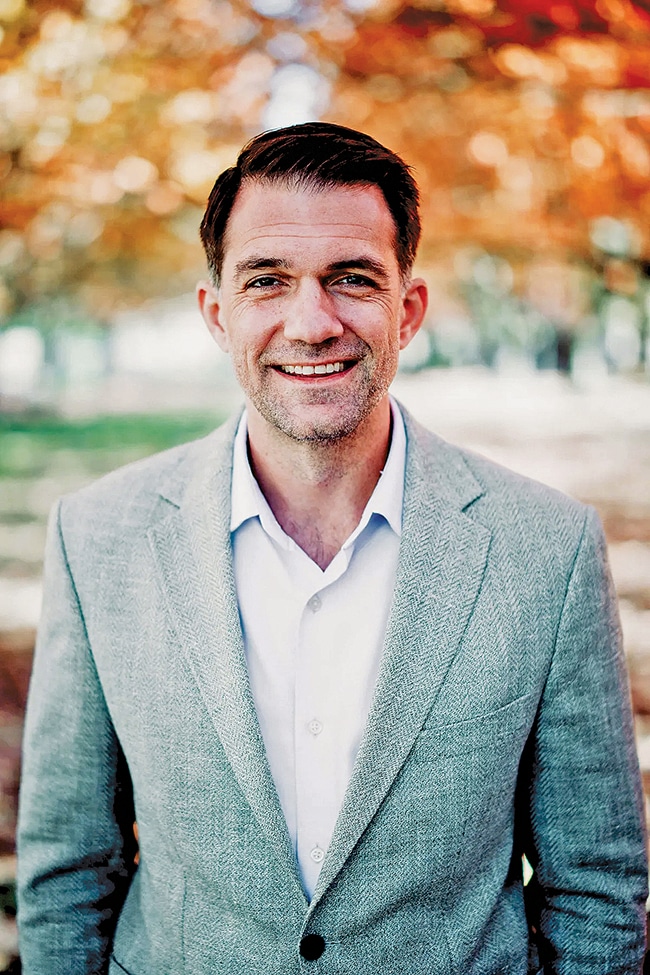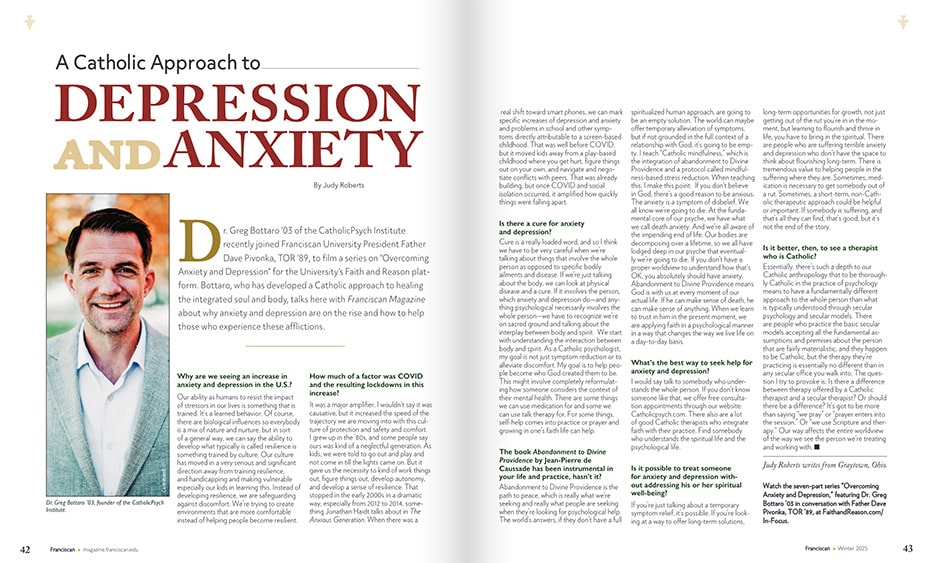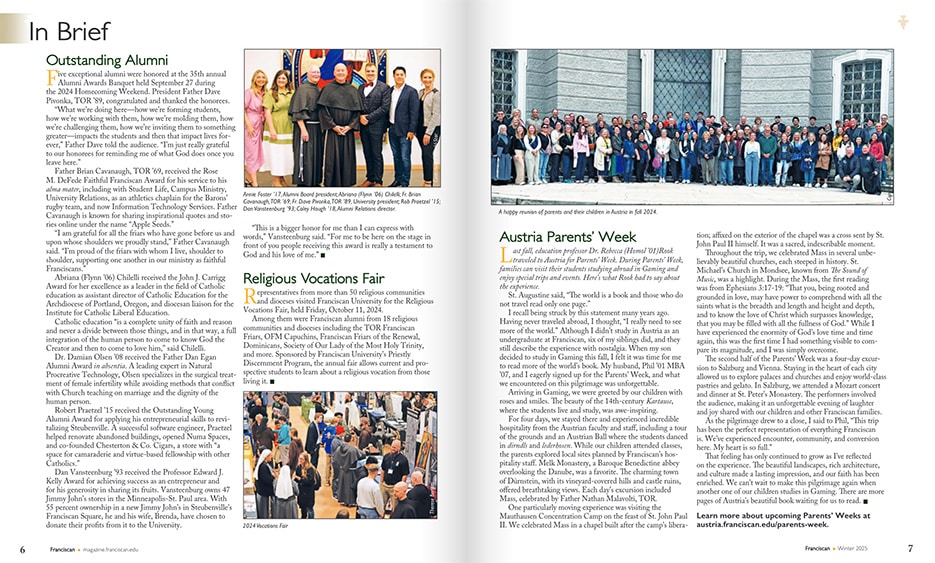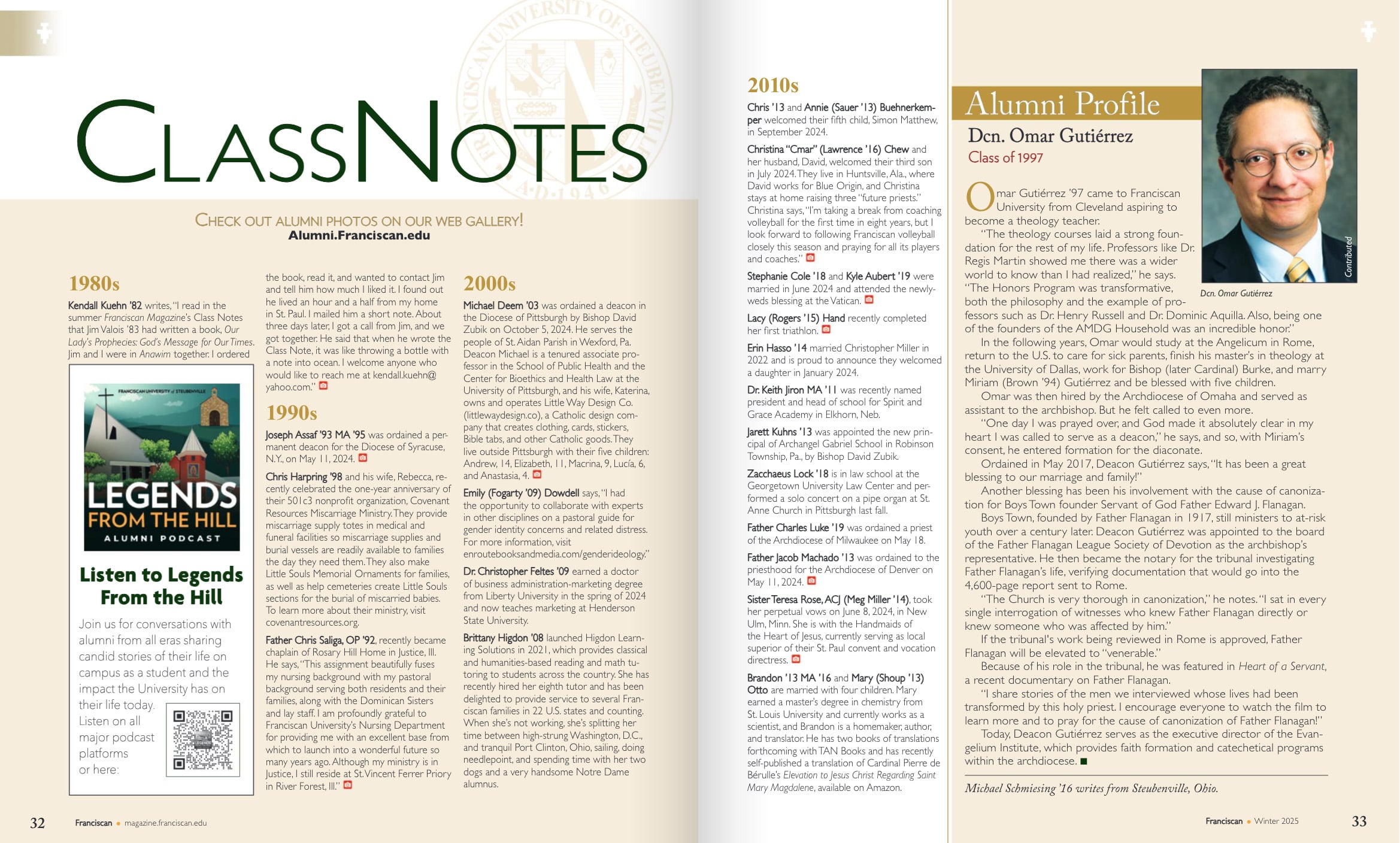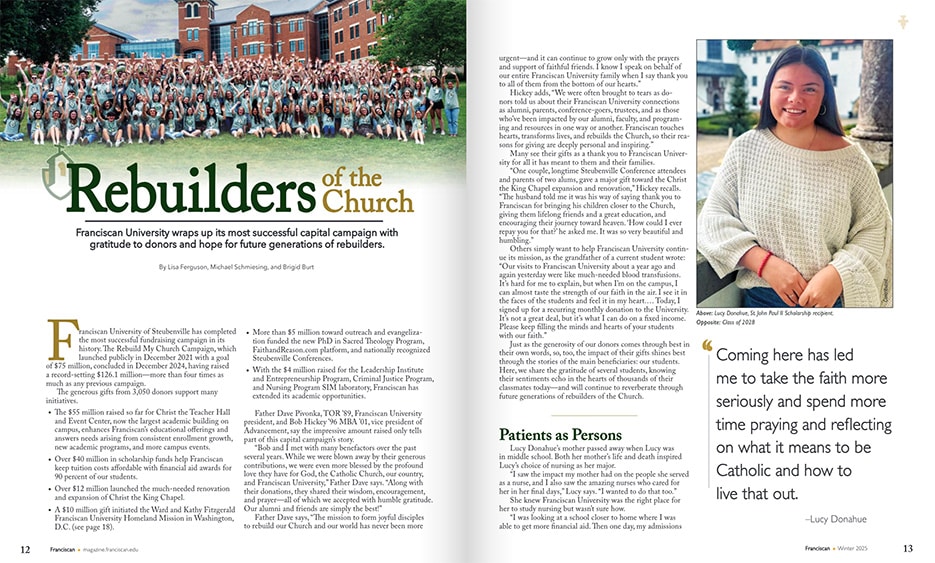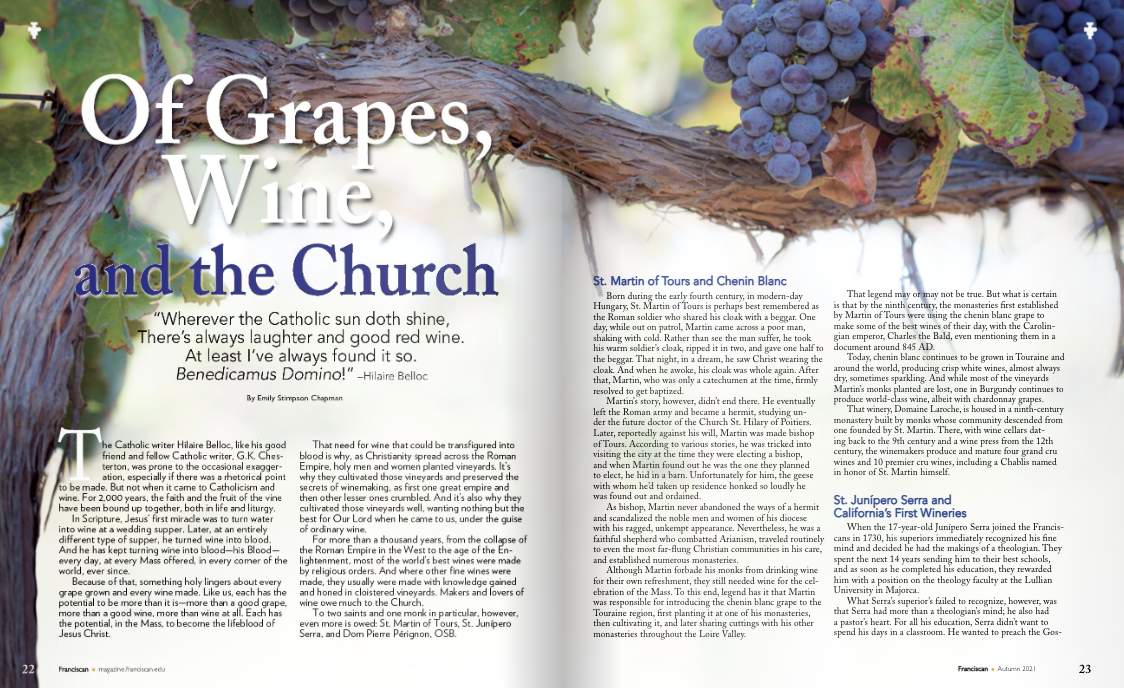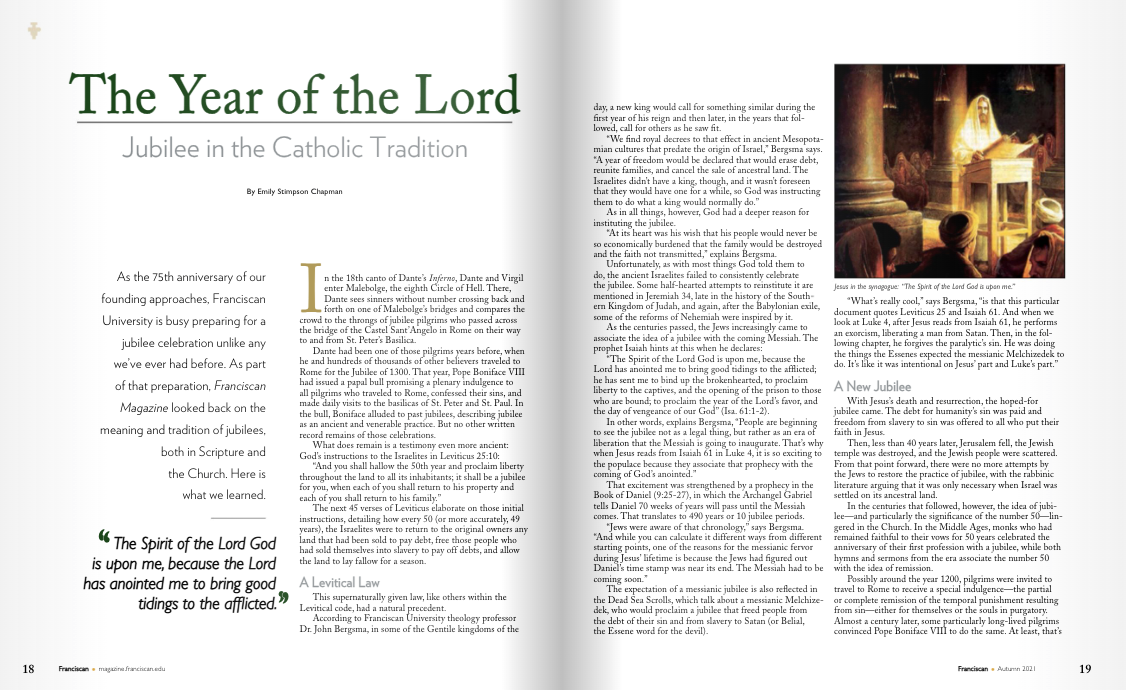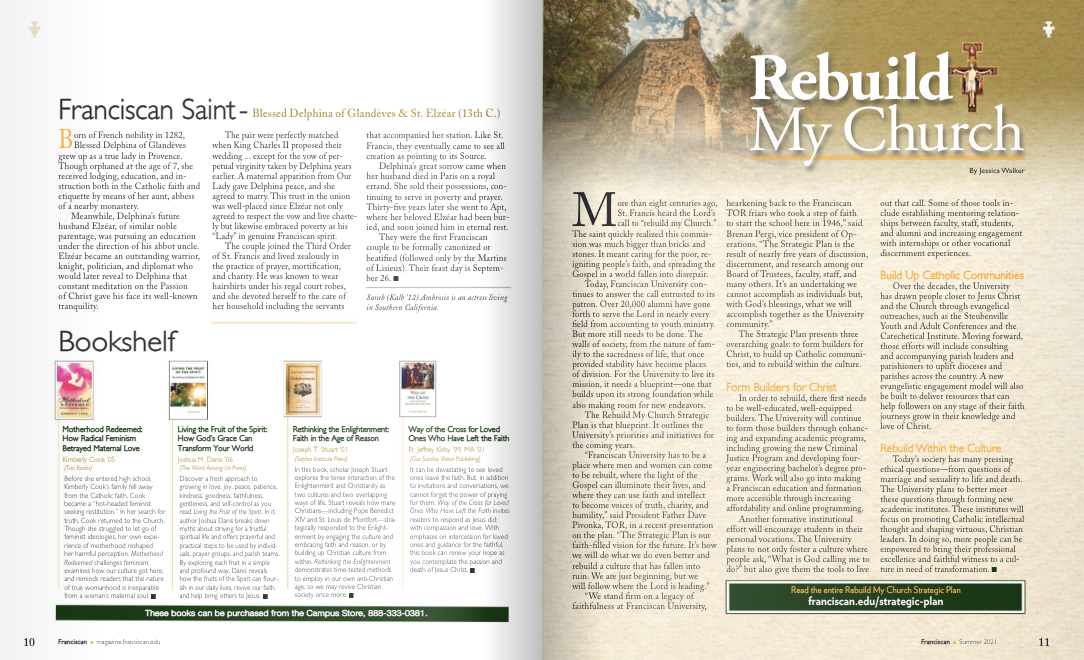Dr. Greg Bottaro ’03 of the CatholicPsych Institute recently joined Franciscan University President Father Dave Pivonka, TOR ’89, to film a series on “Overcoming Anxiety and Depression” for the University’s Faith and Reason platform.
Bottaro, who has developed a Catholic approach to healing the integrated soul and body, talks here with Franciscan Magazine about why anxiety and depression are on the rise and how to help those who experience these afflictions.
Why are we seeing an increase in anxiety and depression in the U.S.?
Our ability as humans to resist the impact of stressors in our lives is something that is trained. It’s a learned behavior.
Of course, there are biological influences so everybody is a mix of nature and nurture, but in sort of a general way, we can say the ability to develop what typically is called resilience is something trained by culture.
Our culture has moved in a very serious and significant direction away from training resilience, and handicapping and making vulnerable especially our kids in learning this.
Instead of developing resilience, we are safeguarding against discomfort. We’re trying to create environments that are more comfortable instead of helping people become resilient.
How much of a factor was COVID and the resulting lockdowns in this increase?
It was a major amplifier. I wouldn’t say it was causative, but it increased the speed of the trajectory we are moving into with this culture of protection and safety and comfort.
I grew up in the ’80s, and some people say ours was kind of a neglectful generation. As kids, we were told to go out and play and not come in till the lights came on.
But it gave us the necessity to kind of work things out, figure things out, develop autonomy, and develop a sense of resilience. That stopped in the early 2000s in a dramatic way, especially from 2012 to 2014, something Jonathan Haidt talks about in The Anxious Generation.
When there was a real shift toward smart phones, we can mark specific increases of depression and anxiety and problems in school and other symptoms directly attributable to a screen-based childhood.
That was well before COVID, but it moved kids away from a play-based childhood where you get hurt, figure things out on your own, and navigate and negotiate conflicts with peers.
That was already building, but once COVID and social isolation occurred, it amplified how quickly things were falling apart.
Is there a cure for anxiety and depression?
Cure is a really loaded word, and so I think we have to be very careful when we’re talking about things that involve the whole person as opposed to specific bodily ailments and disease.
If we’re just talking about the body, we can look at physical disease and a cure. If it involves the person, which anxiety and depression do—and anything psychological necessarily involves the whole person—we have to recognize we’re on sacred ground and talking about the interplay between body and spirit.
We start with understanding the interaction between body and spirit. As a Catholic psychologist, my goal is not just symptom reduction or to alleviate discomfort.
My goal is to help people become who God created them to be.
This might involve completely reformulating how someone considers the context of their mental health. There are some things we can use medication for and some we can use talk therapy for.
For some things, self-help comes into practice or prayer and growing in one’s faith life can help.
The book Abandonment to Divine Providence by Jean-Pierre de Caussade has been instrumental in your life and practice, hasn’t it?
Abandonment to Divine Providence is the path to peace, which is really what we’re seeking and really what people are seeking when they’re looking for psychological help.
The world’s answers, if they don’t have a full spiritualized human approach, are going to be an empty solution.
The world can maybe offer temporary alleviation of symptoms, but if not grounded in the full context of a relationship with God, it’s going to be empty.
I teach “Catholic mindfulness,” which is the integration of abandonment to Divine Providence and a protocol called mindfulness-based stress reduction.
When teaching this, I make this point: If you don’t believe in God, there’s a good reason to be anxious. The anxiety is a symptom of disbelief.
We all know we’re going to die. At the fundamental core of our psyche, we have what we call death anxiety. And we’re all aware of the impending end of life. Our bodies are decomposing over a lifetime, so we all have lodged deep in our psyche that eventually we’re going to die.
If you don’t have a proper worldview to understand how that’s OK, you absolutely should have anxiety.
Abandonment to Divine Providence means God is with us at every moment of our actual life. If he can make sense of death, he can make sense of anything.
When we learn to trust in him in the present moment, we are applying faith in a psychological manner in a way that changes the way we live life on a day-to-day basis.
What’s the best way to seek help for anxiety and depression?
I would say talk to somebody who understands the whole person. If you don’t know someone like that, we offer free consultation appointments through our website: Catholicpsych.com.
There also are a lot of good Catholic therapists who integrate faith with their practice. Find somebody who understands the spiritual life and the psychological life.
Is it possible to treat someone for anxiety and depression without addressing his or her spiritual well-being?
If you’re just talking about a temporary symptom relief, it’s possible.
If you’re looking at a way to offer long-term solutions, long-term opportunities for growth, not just getting out of the rut you’re in in the moment, but learning to flourish and thrive in life, you have to bring in the spiritual.
There are people who are suffering terrible anxiety and depression who don’t have the space to think about flourishing long-term. There is tremendous value to helping people in the suffering where they are.
Sometimes, medication is necessary to get somebody out of a rut. Sometimes, a short-term, non-Catholic therapeutic approach could be helpful or important.
If somebody is suffering, and that’s all they can find, that’s good, but it’s not the end of the story.
Is it better, then, to see a therapist who is Catholic?
Essentially, there’s such a depth to our Catholic anthropology that to be thoroughly Catholic in the practice of psychology means to have a fundamentally different approach to the whole person than what is typically understood through secular psychology and secular models.
There are people who practice the basic secular models accepting all the fundamental assumptions and premises about the person that are fairly materialistic, and they happen to be Catholic, but the therapy they’re practicing is essentially no different than in any secular office you walk into.
The question I try to provoke is: Is there a difference between therapy offered by a Catholic therapist and a secular therapist? Or should there be a difference?
It’s got to be more than saying “we pray” or “prayer enters into the session.” Or “we use Scripture and therapy.”
Our way affects the entire worldview of the way we see the person we’re treating and working with.
Watch the seven-part series “Overcoming Anxiety and Depression,” featuring Dr. Greg Bottaro ’03 in conversation with Father Dave Pivonka, TOR ’89, at FaithandReason.com/In-Focus.



